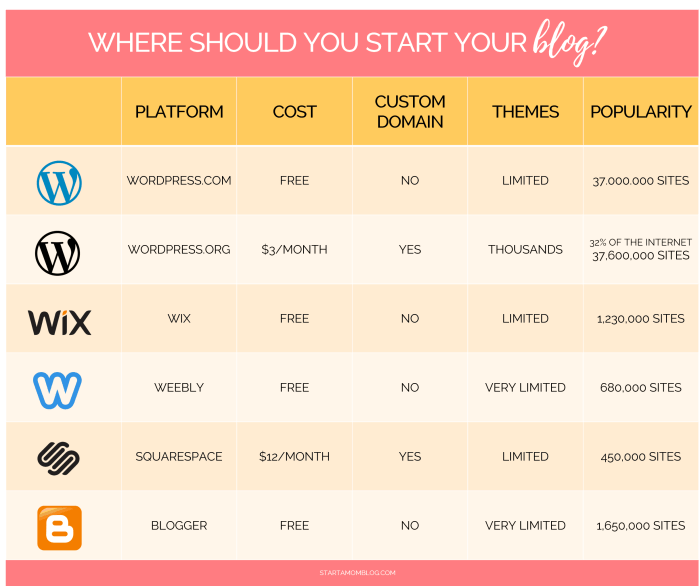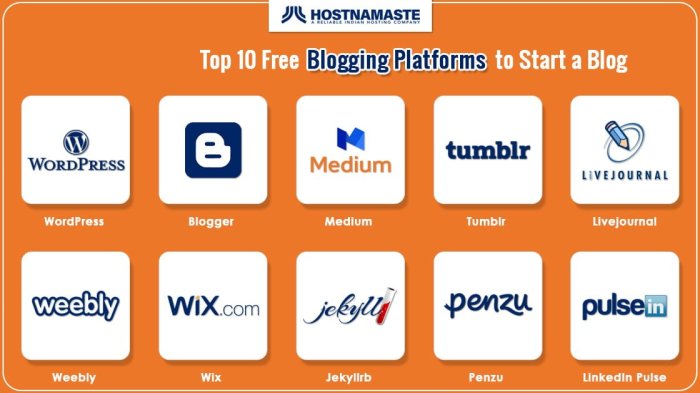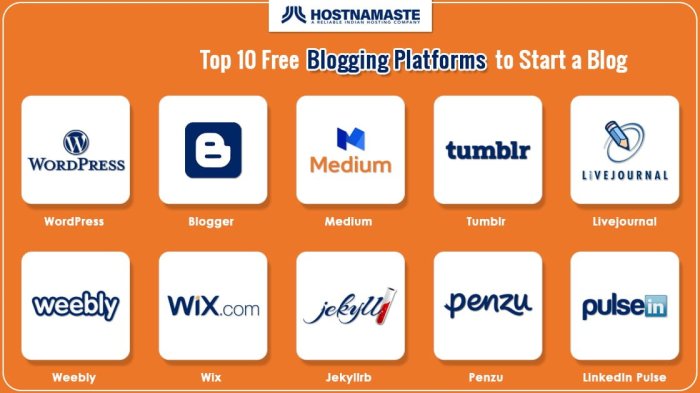Best Blogging Platforms takes center stage, inviting you into a world of creativity and opportunity. Get ready to explore the top platforms and unleash your blogging potential with style.
In the realm of online expression, where words meet design, finding the perfect platform is key. Let’s dive into the realm of Best Blogging Platforms and discover which one suits your style best.
Introduction to Blogging Platforms
When it comes to blogging platforms, we’re talking about the tools and services that allow you to create and manage your blog. Choosing the right platform for your blog is crucial because it can impact the overall success and functionality of your site. With so many options out there, it’s important to consider key features before making a decision.
Key Features to Consider When Selecting a Blogging Platform
- Customization Options: Look for a platform that offers flexibility in design and layout to reflect your unique style and branding.
- Ease of Use: Consider how user-friendly the platform is, especially if you’re a beginner or not tech-savvy.
- Tools: Opt for a platform that provides built-in features to help optimize your blog for search engines.
- Mobile Responsiveness: Make sure the platform is mobile-friendly to reach a wider audience on different devices.
- Integration Capabilities: Check if the platform allows integration with other tools and services you may need for your blog.
Popular Blogging Platforms: Best Blogging Platforms
When it comes to blogging platforms, there are several popular options available, each with its own unique features and benefits. Let’s take a closer look at some of the best-known platforms like WordPress, Blogger, Medium, and Wix.
WordPress
WordPress is one of the most widely used blogging platforms, known for its flexibility and customization options. It offers a wide range of themes and plugins to enhance the functionality of your blog. Pricing can vary depending on whether you choose the self-hosted version or use WordPress.com. Some successful blogs hosted on WordPress include The Blonde Abroad and Smashing Magazine.
Blogger
Blogger, owned by Google, is a free and easy-to-use platform for beginners. It offers basic customization options and integrates seamlessly with other Google services. While Blogger may lack some advanced features compared to other platforms, it is a great starting point for new bloggers. Examples of successful blogs on Blogger include Cupcakes and Cashmere and Pioneer Woman.
Medium
Medium is a unique platform that focuses on high-quality content and storytelling. It has a built-in audience and allows for easy sharing and collaboration. Medium offers a clean and minimalist design, making it ideal for writers who want to focus on their content without worrying about technical details. Successful blogs on Medium include The Mission and The Startup.
Wix
Wix is a website builder that also offers blogging capabilities. It provides a drag-and-drop interface for easy customization and design. While Wix is user-friendly, it may not offer as many blogging-specific features as other platforms. However, it is a good option for bloggers who want a visually appealing website. Some successful blogs hosted on Wix include Green Wedding Shoes and The Dog People.
Customization and Design Options

When it comes to creating a unique and visually appealing blog, customization and design options play a crucial role. Let’s dive into the different ways you can personalize your blog and make it stand out from the crowd.
Customization Options Available, Best Blogging Platforms
- Color Schemes: Many blogging platforms offer the ability to customize the color scheme of your blog to match your brand or personal style.
- Fonts and Typography: You can choose from a variety of fonts and typography options to enhance the readability and visual appeal of your blog.
- Widgets and Plugins: Most platforms allow you to add widgets and plugins to customize the functionality of your blog, such as social media integration, contact forms, and more.
Impact of Themes and Templates
- Themes: Choosing the right theme can greatly impact the overall design and layout of your blog. Whether you prefer a clean and minimalistic look or a bold and colorful design, there are themes to suit every taste.
- Templates: Templates provide a framework for your blog’s design, making it easy to create a cohesive and professional look. You can customize templates to fit your content and branding seamlessly.
Tips for Choosing a Design
- Consider Your Content: Your design should complement the type of content you are sharing. For example, a photography blog may benefit from a visually stunning theme, while a text-heavy blog may require a more minimalist design.
- Stay Consistent: Keep your design elements consistent across your blog to create a cohesive look. This includes colors, fonts, and layout choices.
- User Experience: Prioritize user experience when choosing a design. Make sure your blog is easy to navigate, visually appealing, and loads quickly to keep visitors engaged.
Monetization Opportunities
When it comes to making money from your blog, different platforms offer various opportunities for monetization. Let’s explore how these blogging platforms support advertising, affiliate marketing, sponsored content, and selling products to help you maximize your revenue.
Advertising
Advertising is a common way to monetize your blog. Some platforms offer built-in advertising programs that allow you to display ads on your site and earn revenue based on clicks or impressions. Others may require you to use third-party advertising networks like Google AdSense to manage your ads.
Affiliate Marketing
Affiliate marketing is another popular monetization option where you promote products or services on your blog and earn a commission for every sale or lead generated through your referral. Many blogging platforms provide plugins or integrations to easily add affiliate links to your content.
Sponsored Content
Sponsored content involves partnering with brands or companies to create posts that promote their products or services. Some platforms have built-in features to help you disclose sponsored content and manage these partnerships effectively.
Selling Products
If you have your own products or services to sell, some platforms offer e-commerce capabilities that allow you to set up an online store directly on your blog. You can also integrate third-party payment processors to facilitate transactions seamlessly.
Maximizing Revenue
To maximize your revenue through different monetization strategies, it’s essential to diversify your income streams and experiment with various approaches. Focus on creating high-quality content that resonates with your audience and aligns with your monetization goals to drive engagement and conversions.
and Analytics Features

When it comes to running a successful blog, (Search Engine Optimization) and analytics play a crucial role in attracting more readers and understanding your audience. Let’s dive into how different blogging platforms support these features and how you can leverage them to grow your blog.
Importance of for a Blog
is like the secret sauce that helps your blog get discovered by search engines like Google. It involves optimizing your content with relevant s, meta descriptions, and backlinks to improve your blog’s visibility in search results.
- Choose a blogging platform that allows you to customize your meta tags and URLs for better .
- Create high-quality, engaging content that is optimized for specific s relevant to your niche.
- Focus on building backlinks from reputable sites to increase your blog’s authority and visibility.
Analytics Tools Provided by Blogging Platforms
Analytics tools are essential for tracking your blog’s performance, understanding your audience, and identifying areas for improvement. Different platforms offer various analytics features to help you measure your blog’s success.
- Platforms like WordPress and Blogger provide built-in analytics tools to track your site traffic, page views, and audience demographics.
- Some platforms offer integration with Google Analytics for more advanced tracking and reporting capabilities.
- Utilize analytics data to identify your most popular content, track user engagement, and make data-driven decisions to optimize your blog.
Tips for Improving and Using Analytics Data
Now that you understand the importance of and analytics, here are some tips to help you improve your blog’s visibility and audience engagement:
- Regularly update your content with fresh, relevant information to keep readers coming back and improve your search rankings.
- Monitor your analytics data to identify trends, popular topics, and areas where you can improve user experience.
- Optimize your site speed, mobile responsiveness, and user experience to enhance and keep visitors engaged.
